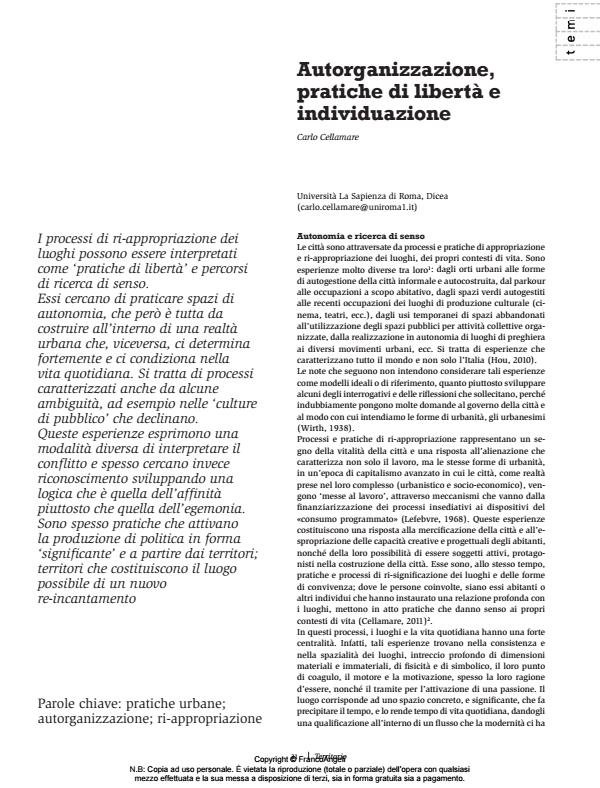Self-organisation, individuation and freedom practices
Journal title TERRITORIO
Author/s Carlo Cellamare
Publishing Year 2014 Issue 2014/68 Language Italian
Pages 7 P. 21-27 File size 2301 KB
DOI 10.3280/TR2014-068003
DOI is like a bar code for intellectual property: to have more infomation
click here
Below, you can see the article first page
If you want to buy this article in PDF format, you can do it, following the instructions to buy download credits

FrancoAngeli is member of Publishers International Linking Association, Inc (PILA), a not-for-profit association which run the CrossRef service enabling links to and from online scholarly content.
The processes of reappropriating places can be seen as ‘freedom practices’ and quests for meaning. They seek to establish spaces of autonomy, to be constructed, however, entirely within an urban environment that, conversely, has a powerful determining effect on us and conditions us in our everyday lives. These processes are characterised by certain ambiguities - in the ‘public cultures’ that they articulate, for example. These experiences offer a different way of interpreting conflict, frequently seeking recognition through an approach marked by affinity more than hegemony. These practices often stimulate the development of policy in ‘significant’ form, springing from local communities, which represent the potential place for a new ‘re-enchantment’.
Keywords: Urban practices; self-organisation; reappropriation
- Aa.Vv., 2012, «Conflitti», a cura di Ilardi M., Outlet. Per una critica della ideologia italiana, n. 2 (numero monografico).
- Abruzzese A., 2012, «I vivi e i morti: fantasie metropolitane», in Antonelli R., Macioti M.I. (a cura di), Metamorfosi. La cultura della metropoli, Viella, Roma, pp. 451-482.
- Battistelli F., 2012, «Conflict and the City», in Antonelli R., Macioti M.I. (a cura di), Metamorfosi. La cultura della metropoli, Viella, Roma
- Brenner N., Marcuse P. and Mayer M., 2012, eds., Cities for People, not for Profit. Critical Urban Theory and the Right to the City, Routledge, London-New York.
- Castoriadis C., 1975, L’institution imaginarie de la societé. II: L’imaginaire social et l’institution, Editions du Seuil, Paris (trad. it., 1995, L’istituzione immaginaria della società, Bollati Boringhieri, Torino).
- Cellamare C., 2011, Progettualità dell’agire urbano. Processi e pratiche urbane, Carocci, Roma.
- Day R.J.F., 2005, Gramsci is Dead. Anarchist Currents in the Newest Social Movements, Pluto Press, London (trad. it., 2008, Gramsci è morto. Dall’egemonia all’affinità, Elèuthera, Milano).
- Foucault M., 2001, Biopolitica e liberalismo, Medusa, Milano.
- Gasparini G., 2001, Tempo e vita quotidiana, Laterza, Roma-Bari.
- Graeber D., 2007, There Never was a West: Or, Democracy Emerges from the Spaces in Between, AK Press, Usa (trad. it., 2012, Critica della democrazia occidentale. Nuovi movimenti, crisi dello Stato, democrazia diretta, Elèuthera, Milano).
- Gramsci A., 1997, Le opere. La prima antologia di tutti gli scritti (a cura di Santucci A.), Editori Riuniti, Roma.
- Harvey D., 2012, Il capitalismo contro la città, Ombre Corte, Verona.
- Hou J., 2010, ed., Insurgent Public Space. Guerrilla Urbanism and the Remaking of Contemporary Cities, Routledge, London-New York.
- Krasny E., 2012, ed., Hands-on Urbanism 1850-2012. The right to Green, Architekturzentrum Wien, Mccm Creations, Wien.
- Lefebvre H., 1968, Le droit à la ville, Éditions Anthropos, Paris (trad. it., 1970, Il diritto alla città, Marsilio, Padova).
- Pasqui G., 2010, «Progetto, interazione, conflitto», in Paba G., Perrone C. (a cura di), Partecipazione e politiche territoriali, numero monografico di Contesti, n. 1, all’Insegna del Giglio, Firenze, pp. 40-48.
- Pasqui G., 2012, «Azione pubblica, partecipazione, conflitti. Riflessioni in forma di tesi», in Cancellieri A., Scandurra G. (a cura di), Tracce urbane. Alla ricerca della città, FrancoAngeli, Milano, pp. 197-204.
- Revelli M., 2013, Finale di partito, Einaudi, Torino.
- Simondon G., 1989, L’individuation psychique et collective, Aubier, Paris
- (trad. it. Virno P., a cura di, 2004, L’individuazione psichica e collettiva, DeriveApprodi, Roma).
- Stiegler B., 2006, Réenchanter le monde. La valeur esprit contre le populisme industriel, Flammarion, Paris (trad. it., Vignola P., a cura di, 2012,
- Reincantare il mondo. Il valore spirito contro il populismo industriale, Orthotes, Napoli).
- Ward C., 1973, Anarchy in Action [trad. it., 2010, Anarchia come organizzazione, Elèuthera, Milano).
- Ward C., 1997, Reflected in Water. A Crisis of Social Responsibility (trad. it., 2003, Acqua e comunità. Contro la privatizzazione di un bene comune, Elèuthera, Milano).
- Wirth L., 1938, «Urbanism as a Way of Life», The American Journal of Sociology, vol. 44, n. 1, pp. 1-24, The University of Chicago Press.
- Zagrebelsky G., 2013, «Il cammino in comune», La Repubblica, 23 settembre, pp. 56-57.
- Emergenza abitativa e pratiche informali. Il caso di Roma Rossana Galdini, in SOCIOLOGIA URBANA E RURALE 112/2017 pp.18
DOI: 10.3280/SUR2017-112003 - Developments in Design Research and Practice II Ambra Borin, Laura Galluzzo, pp.27 (ISBN:978-3-031-32279-2)
Carlo Cellamare, Autorganizzazione, pratiche di libertà e individuazione in "TERRITORIO" 68/2014, pp 21-27, DOI: 10.3280/TR2014-068003